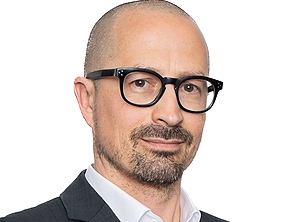BASF
Chemical recycling should be part of reclaim rates, sustainability manager says / Interview with German engineering association
 Matthias Scheibitz (Photo: BASF)
|
To contribute to the transformation to a functioning circular economy, chemical recycling finally needs “reliable legal” framework conditions, said Matthias Scheibitz, the head of sustainability strategy at the Performance Materials business unit of German chemical giant BASF (Ludwigshafen; www.basf.com). The manager was quoted at length in an interview with the plastics and rubber machinery division of the German engineering association VDMA (KuG, Frankfurt; http://kug.vdma.org).
He said chemical recycling must be recognised in regulations for plastics reclaim rates “if, for example, a recycled content of 30% is required for packaging”.
Today, only 0.1% of the plastic waste generated in the EU is chemically recycled. However, the manager noted that experts estimate that this proportion could be increased to up to 15%.
The introduction of extended producer responsibility (EPR) would also be helpful here. Scheibitz cited the example of a manufacturer of, for example, packaging, a car, or a refrigerator, paying a certain amount into a pot from which the return of the product is financed. He said this is something that does not yet exist with the so-called performance materials that BASF supplies to its core industries, the automotive and construction sectors.
Related: UK government explains postponement of EPR scheme
For chemical recycling to be established as further process alongside mechanical recycling, investments are needed in addition to the regulatory requirements, he explained. In this case, the chemical industry is planning projects worth more than EUR 7 bn by 2030, the manager noted, citing figures from Plastics Europe Germany (Frankfurt; www.plasticseurope.org).
Until these steps pay off, however, BASF has been relying on the mass-balance method, according to Scheibitz. “One big advantage is that we can use existing systems. Early in the value chain, we substitute fossil raw materials with circular raw materials, ie. crude oil with pyrolysis oil, and then allocate these to specific products. We then have this process and each individual product certified by an independent body.”
In Europe, 23% of plastics waste currently goes to landfill, 42% is “energy recovered” – read incinerated – and around 35% is mechanically recycled. “We believe that there will be further improvements in recycling processes, not only for chemical, but also for mechanical,” Scheibitz said, noting that a combination of the two technologies can certainly lead to an “optimal result”.
He said chemical recycling must be recognised in regulations for plastics reclaim rates “if, for example, a recycled content of 30% is required for packaging”.
Today, only 0.1% of the plastic waste generated in the EU is chemically recycled. However, the manager noted that experts estimate that this proportion could be increased to up to 15%.
The introduction of extended producer responsibility (EPR) would also be helpful here. Scheibitz cited the example of a manufacturer of, for example, packaging, a car, or a refrigerator, paying a certain amount into a pot from which the return of the product is financed. He said this is something that does not yet exist with the so-called performance materials that BASF supplies to its core industries, the automotive and construction sectors.
Related: UK government explains postponement of EPR scheme
For chemical recycling to be established as further process alongside mechanical recycling, investments are needed in addition to the regulatory requirements, he explained. In this case, the chemical industry is planning projects worth more than EUR 7 bn by 2030, the manager noted, citing figures from Plastics Europe Germany (Frankfurt; www.plasticseurope.org).
Until these steps pay off, however, BASF has been relying on the mass-balance method, according to Scheibitz. “One big advantage is that we can use existing systems. Early in the value chain, we substitute fossil raw materials with circular raw materials, ie. crude oil with pyrolysis oil, and then allocate these to specific products. We then have this process and each individual product certified by an independent body.”
In Europe, 23% of plastics waste currently goes to landfill, 42% is “energy recovered” – read incinerated – and around 35% is mechanically recycled. “We believe that there will be further improvements in recycling processes, not only for chemical, but also for mechanical,” Scheibitz said, noting that a combination of the two technologies can certainly lead to an “optimal result”.
09.08.2023 Plasteurope.com [253301-0]
Published on 09.08.2023

 German version of this article...
German version of this article...